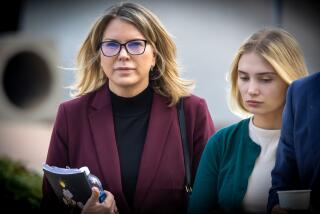Judge Won’t Block Inmate’s Bid for Freedom
- Share via
A federal judge ruled Wednesday that a San Fernando Valley man who claims he was falsely convicted of killing his mother has demonstrated he is probably innocent and should be allowed to seek freedom despite having missed a deadline to appeal.
The ruling by U.S. District Judge Virginia A. Phillips is a significant step in state prison inmate Bruce Lisker’s quest to have his 1985 conviction overturned, legal observers said.
“The writing is on the wall here,” said Laurie Levenson, a former federal prosecutor and law school professor who has been following the case. “It sounds like -- very soon -- the state is going to have two choices: Either give this guy a new trial or let him go.”
Nathan Barankin, a spokesman for California Atty. Gen. Bill Lockyer, whose office is seeking to uphold Lisker’s conviction, said the case would be handled “like any other.”
“We’re reviewing the decision and all of our options,” he said.
Phillips adopted the findings of U.S. Magistrate Ralph Zarefsky, who concluded in May that the case against Lisker had been “effectively dismantled” and that “no reasonable juror” would convict him in light of new and previously undisclosed evidence.
Lisker had begun the court process by filing a federal habeas corpus petition, arguing that state officials had wrongly imprisoned him. But because his filing had missed a procedural deadline, state prosecutors argued that such an appeal was improper.
Phillips agreed with the magistrate that because of the new evidence Lisker’s petition should continue to be considered. But the ruling itself is not sufficient to have his case overturned.
When the case returns to Zarefsky, Lisker’s lawyers must convince the magistrate that their client’s constitutional rights to effective assistance of counsel and to have a lawyer present during questioning were violated.
Specifically, they intend to argue that Lisker’s trial attorney, Dennis E. Mulcahy, failed to present compelling evidence that one of Lisker’s friends was a suspect in the killing and that a jailhouse informant who says Lisker confessed to him was actually working on behalf of police and had fabricated the confession.
“It’s sort of backward, really,” said William J. Genego Jr., one of Lisker’s attorneys. “Now that Bruce has proven that any reasonable juror would find him not guilty, he has to show that his rights were also violated during the process.”
Levenson, the Loyola law professor, said a 57-page report that Zarefsky issued in May -- in which he concluded that the original case against Lisker had been “effectively dismantled” -- seemed to send a clear message about his thoughts on the case.
“I think you have a judge who believes this defendant fundamentally did not receive a fair trial,” she said.
On March 10, 1983, there was good reason to suspect that Lisker -- then 17 -- might have committed the crime. He had a history of drug abuse and fighting with his mother, Dorka Lisker. His parents had paid for him to live in a studio apartment several miles from the family home.
And he was the first to report the brutal attack on his 66-year-old mother to authorities.
Lisker told police that he went to his parents’ home to borrow a jack so he could fix his car. While there, he said, he looked through windows at the back of the house and saw his mother lying on the floor. Lisker said he broke in to tend to her. Though she was still alive, she had been badly beaten and stabbed in the back. He called for paramedics.
The detective in the case, Andrew R. Monsue, didn’t believe the frizzy-haired teenager’s story and arrested him that afternoon. Lisker was convicted in 1985 and sentenced to 16 years to life.
At his trial, Lisker was implicated by blood spatter on his clothes; he allegedly confessed to a jailhouse informant; bloody shoeprints placed him at the scene; and it was allegedly impossible for him to have seen his mother from the back of the house because furniture and an indoor stone planter would have blocked his view.
Since then, nearly every aspect of the prosecution’s case has been seriously challenged or proved wrong, first as part of a seven-month Times investigation last year and later at an evidentiary hearing in December in front of Zarefsky.
A jury hearing the case today, Zarefsky concluded in that hearing report, “would know that there is essentially no evidence of Lisker’s guilt.”
scott.glover@latimes.com
More to Read
Sign up for Essential California
The most important California stories and recommendations in your inbox every morning.
You may occasionally receive promotional content from the Los Angeles Times.










